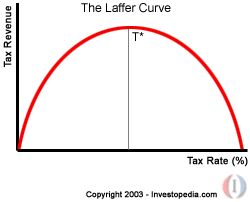Obama has been all out in his assertion that we need to tax the rich to bring in more revenue so that we can get this pesky deficit under control. He doesn’t mention that he accelerated the level of deficit spending so we are now careening off a fiscal cliff. His logic and thought process to higher taxes equating higher levels of revenue are also very much off base.
Much is being made of his new proposal to lower corporate tax rates. Like most things Obama, the headline is good but the details leave a lot to be desired. This is a President that hates private industry and believes solely in big government solutions to fix problems. Remember, he destroyed the bankruptcy process with car companies and we are left with government holding 26% of GM equity. It’s a loser, just like his new plan. 
Instead of a blanket lowering of the rate on all corporations, Obama picks winners and losers and offers incentives for things like green energy. He eliminates loop holes for his least favorite kinds of companies, and opens or extends them for his favorite kinds of companies. The corporate tax proposal is simply another campaign document that gives Obama a good soundbite for the uninformed.
It brings us back to the question I proposed at the top of this post. Why don’t higher taxes bring in higher amounts of revenue? It has to do with calculus. Think of tax revenue as a curve. Here is a parabola. A parabola that looks like this is the way most people think of tax rates.
The lower you make the rate, the lower amount of revenue you generate. That is the accountants way to look at taxes, and why government numbers are always wrong no matter which party is quoting them. Even in the Republican numbers designed to poke holes in the Obama budget, I see usage of accounting numbers to make their point when convenient.
Recommended
In reality, people's behavior changes significantly in response to tax rates. "At the margin" is what you need to focus on and get familiar with. Will the incentive to increase production and income increase if tax rates decrease on the next dollar made? Of course they do. More production then leads to higher amounts of revenue generated, even at lower rates. Of course, there is a limit to how low the rate can go before the curve starts to turn the other way.
In economics, what I just described as setting the tax rate where the marginal cost of producing the next dollar equals the marginal revenue of that dollar. It's a classic microeconomic concept and when applied to private business, both liberals and conservatives agree it works.
It gets controversial in public policy debates because of lobbying, and the desire for one party to find a win for its constituency. However, what I just described above also describes the Laffer curve.
Liberals love to say it doesn’t work. But we have evidence it does. Our first test was the 1982 tax cut that Reagan proposed. He eliminated deductions and lowered the top rate to 28%. What happened? Economic production took off and government revenue increased. Second test. Bush tax cuts. What happened? Tax rates were lowered and government revenue increased.
Liberals love to point to the Clinton years. However, along with the small tax increase Clinton enacted at the beginning of his term, what else happened? The internet came along and increased the productivity of business with a decrease in expenditures. Even Alan Greenspan at the time couldn’t figure it out because it was so broad based and infiltrated segments of the economy that had never been made that efficient. Second, the 1994 Republican lead Congress forced the Clinton administration to limit their spending. They like to brag they balanced the budget, but those are just accounting numbers. The federal budget has never been balanced-or had a surplus. Bring in off balance sheet assets and liabilities and you will see. So the Clinton years don’t poke a hole in the thesis that lower taxes equate to higher government revenue.
Here is the latest data on tax hikes. In England, they raised taxes on the wealthy. Sound familiar? Guess what happened? Revenues decreased and so did economic activity. If we raise taxes on the wealthy like Obama and the Democrats desperately want, we will kill our economy and increase the deficit because not only will revenue decrease, but economic activity will drop. Incentives will be misaligned.
Want evidence of how accounting numbers screw up your decision making? Go back and look at a family trip you completed over the last few years. Check the receipts. Try and complete that same trip today going to the same places and having the same experiences. My guess is that prices for many parts of your trip have changed and you would make a different decision today going forward than you did before. You might take a different airline, drive vs fly, stay at a different hotel, eat at a different restaurant. Depending on the expected price, you might choose not to undertake that trip or go somewhere different. Accounting is what you did in the past, economic numbers are the ones facing you in the future. Economic numbers shape your behavior and decisions going forward, not accounting.
When it comes to public policy, economics not accounting should rule when planning the future. Instead, the public debate is filled with accounting. Accounting only tells you where you have been. Accounting is static analysis. Accounting says governments won’t earn revenue when they will, and it also tells them they will earn revenue when they won’t. Yet, virtually all the analysis we see, hear politicians cite, and listen to talking heads spew out is accounting analysis. That leads to a misinformed populace and explains a lot of why we are headed in the direction we are going.

























Join the conversation as a VIP Member